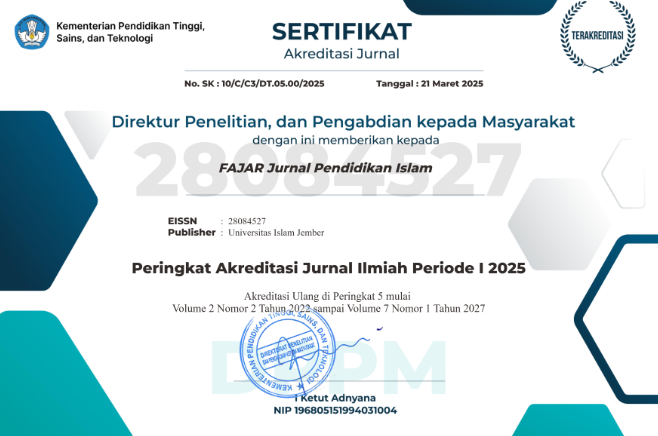SIḤR AND THE MUSLIM CREED: A THEOLOGICAL APPRAISAL OF IBN ʿABDIL WAHHĀB’S DISCOURSE AND ITS CONTEMPORARY IMPLICATIONS IN ILORIN
DOI:
https://doi.org/10.56013/fj.v5i2.4434Keywords:
Siḥr (Islamic Sorcery), Tawḥīd and Shirk, Religious Pluralism in Islam, Cultural Schema Theory, Islam in IlorinAbstract
Belief in and engagement with Siḥr (magic or sorcery) remains a persistent feature of religious life in many Muslim communities, particularly in sub-Saharan Africa, where Islamic orthodoxy often coexists with indigenous cosmologies. In Ilorin, Nigeria—a historically significant Islamic centre—practices associated with Siḥr continue to thrive despite the city’s deep-rooted Sunni heritage. This phenomenon poses a theological contradiction to classical reformist doctrines, notably those advanced by Shaykh Muḥammad Ibn ʿAbdil Wahhāb in Kitāb at-Tawḥīd, where Siḥr is categorically condemned as an act of Shirk (polytheism) and a nullifier of Tawḥīd (Islamic monotheism). The paper critically examines the discourse on Siḥr in Kitāb at-Tawḥīd and assesses its relevance to the beliefs and practices of Muslims in Ilorin. The research adopts a textual-analytical and expository method, rooted in classical Islamic scholarship, complemented by socio-anthropological interpretation based on informal field interviews and observed ritual patterns. It also integrates Cultural Schema Theory and Cognitive Anthropology to explain how theological doctrines are negotiated in local religious contexts. Findings reveal that various forms of Siḥr—such as love magic, separation rituals, economic charms, and protective amulets—are practised by Muslims across sectarian lines, including Sunni, Sufi, and Shia orientations. These practices are often justified through localised interpretations of spirituality, gender roles, and moral intention. The paper concludes that Siḥr in Ilorin reflects a pluralistic religious consciousness, where cultural resilience often challenges doctrinal rigidity. This research contributes to Islamic studies and religious anthropology by offering a contextual and interdisciplinary perspective on belief and ritual in contemporary Muslim societies.
References
Abbas, S. (2014). At Freedom's Limit: Islam and the Postcolonial Predicament. Fordham University Press.
Adefarakan, E. T. (2011). Yoruba indigenous knowledges in the African Diaspora: knowledge, power and the politics of indigenous spirituality (Doctoral dissertation).
Ahmad, M., & Greer, I. (2022). Shāh Walī Allāh in Defence of Ibn Taymiyyah. Islamic Studies, 61(1), 25–44.
Al Chukwuma, O., & Clement, U. A. (2014). Materialism and commodification of the sacred: A political economy of spiritual materialism in Nigeria. European scientific journal, 10(14).
Alade, O. S. (2022). Spiritualism and Functionalism of the Glorious Qurân an in the Eyes of the Yoruba Muslims of Nigeria: A Critical Analysis. NIU Journal of Social Sciences, 7(4), 133–142.
Andresen, J. (Ed.). (2001). Religion in mind: Cognitive perspectives on religious belief, ritual, and experience. Cambridge University Press.
Arkoun, M. (2003). Rethinking Islam Today. The Annals of the American Academy of Political and Social Science, 588(1), 18-39.
Ashiru, N. O. (2013). Political Islam: Fundamentalism and the Politicisation of Religion in Nigeria (Doctoral dissertation, University of Lagos (Nigeria)).
Ayuba, D., Fadele, P. K., Ogaya, J. B., Olayinka, K. E., Sharma, S. N., & Lucero-Prisno III, D. E. (2024). Understanding the root of healing and beyond: Exploring the way forward for Alternative Medicine in Nigeria. Bhutan Sorig Journal, 1(1), 42–47.
Baradaran Amini, S. (2024). A shift in Shia discourse: Political necessities and Sectarian dynamics (Doctoral dissertation, University of Illinois at Urbana-Champaign).
Beaman, L. G. (2008). Defining harm: Religious freedom and the limits of the law. UBC Press.
Boivin, M. (2012). The Sufi Centre of Jhok Sharif in Sindh (Pakistan): Questioning the Ziyārat as a Social Process. South Asian Sufis: Devotion, Deviation and Destiny, 95-110.
Boland, T. (2020). The wholly social or the holy social: Recognising theological tensions in sociology. International Journal of Philosophy and Theology, 81(2), 174–192.
Catalano, D. C. J., Wagner, R., & Davis, T. (2018). Approaching Masculinities Through a Gender‐Aware Practice Framework. New Directions for Student Services, 2018(164), 11–17.
Clarke, I. (Ed.). (2010). Psychosis and spirituality: Consolidating the new paradigm. John Wiley & Sons.
Dube, M. W., Musili, T. K., & Owusu-Ansah, S. (Eds.). (2024). African women's legends and the spirituality of resistance. London: Routledge.
Ejdus, F. (2020). Crisis and ontological insecurity (pp. 7-37). Cham: Springer International Publishing.
Fitouchi, L., & Singh, M. (2022). Supernatural punishment beliefs as cognitively compelling tools of social control. Current opinion in psychology, 44, 252–257.
Hoshino-Browne, E., Zanna, A. S., Spencer, S. J., Zanna, M. P., Kitayama, S., & Lackenbauer, S. (2005). On the cultural guises of cognitive dissonance: the case of easterners and westerners. Journal of personality and social psychology, 89(3), 294.
Ibrahim, S. (2024). The Concept of Sin in Christianity and Islam and Its Influence on Christian-Muslim Relations (Doctoral dissertation, St. Paul's University).
Jones, N. A., Ross, H., Lynam, T., Perez, P., & Leitch, A. (2011). Mental models: an interdisciplinary synthesis of theory and methods. Ecology and society, 16(1).
Kaddouri, S. (2013). Refutations of Ibn Ḥazm by Mālikī Authors from al-Andalus and North Africa. In Ibn Ḥazm of Cordoba (pp. 539-599). Brill.
Katz, M. (2005). The Study of Islamic Ritual and the Meaning of Wuḍūʾ. Der Islam, 82(1), 106-145.
Lerner, A. B. (2024). Global injustice and the production of ontological insecurity. European Journal of International Relations, 30(3), 595-618.
Makris, G. (2023). The Sudanese zār ṭumbura cult: slaves, armies, spirits and history. Routledge.
Malowa, R. B. (2024). African women and spirituality: a study of narratives and agency (Doctoral dissertation, University of the Free State).
Mandaville, P., & Hamid, S. (2018). Islam as statecraft: How governments use religion in foreign policy. Washington, DC: Brookings Institution.
Marcus-Sells, A. (2022). Sorcery or Science? Contesting Knowledge and Practice in West African Sufi Texts. Penn State Press.
Melvin-Koushki, M. (2019). Magic in Islam between Religion and Science. Magic, Ritual, and Witchcraft, 14(2), 255–287.
Mohamad, M. A., & Othman, N. (2017). The Ruqyah Syar’iyyah spiritual method as an alternative for depression treatment. Life Science Journal, 14(2), 79.
Moro, P. A. (2018). Witchcraft, sorcery, and magic. The international encyclopedia of anthropology, 1–9.
Musa, S. M. (2022). The Emergence of a Scholar from a Garrison Society: A contextual analysis of Muhammad Ibn Abd al-Wahhāb's doctrine in the light of the Qur’ān and Hadīth (Doctoral dissertation, University of Wales Trinity Saint David (United Kingdom)).
Mustafa, A. S. M. (2023). The methodology of deducing the jurisprudential rules from the Qurʾan by Imam Al-Jaṣṣāṣ [D. 370 AH] and Imam IlKiyā Al-Harrāsī (Doctoral dissertation, Al-Azhar University, Cairo).
Neville, R. C. (1995). The truth of broken symbols. State University of New York Press.
Oloruntele, O. A. (2009). Evil forces and shirk among the Yoruba Muslims in Nigeria with special reference to Ilorin city (Doctoral dissertation, University of Birmingham).
Parret, H. (2022). 10. Communication, Manipulation, Seduction. This Obscure Thing Called Transparency: Politics and Aesthetics of a Contemporary Metaphor, 213.
Pizzi, P. (2024). Tawḥīd as Social Justice: The Anthropocentric Hermeneutics of the Syrian Theologian Jawdat Saʿīd. Journal of Qur'anic Studies, 26(1), 63–100.
Pomerantz, M. A. (2018, November). A Maqāmah on the Book Market of Cairo in the 8th/14th Century: The “Return of the Stranger” of Ibn Abī Ḥaǧalah (d. 776/1375). In The Sultan's Anthologist-Ibn Abi Hagalah and His Work (pp. 179–208). Ergon-Verlag.
Qamar, A. H. (2013). The concept of the ‘evil’ and the ‘evil eye’ in Islam and Islamic faith-healing traditions. Journal of Islamic Thought and Civilisation, 3(2), 44–53.
Rassool, G. H. (2018). Evil eye, jinn possession, and mental health issues: An Islamic perspective. Routledge.
Rassool, G. H. (2024). Synthesis and Consolidation of Spirituality and Islāmic Psychotherapy. In Exploring the Intersection of Islāmic Spirituality and Psychotherapy: Healing the Soul (pp. 175–184). Cham: Springer Nature Switzerland.
Rizapoor, H., & Athar, M. T. (2023). The Controversy Surrounding the Prophet's Affliction with Magic: An Analytical Exploration of Historical and Contemporary Perspectives among Islamic Scholars. International Journal of Humanities Education and Social Sciences, 3(2).
Saif, L. (2021). A Study of Ikhwān al-Ṣafāʾ’s Epistle on Magic, the Longer Version (52b). Islamicate Occult Sciences in Theory and Practice, 162–206.
Selove, E., & Sanad, M. (2023). The Sorcerer Scholar: Sirāj al-Dīn al-Sakkākī between Grammar and Grimoire. In Knowledge and Power in Muslim Societies: Approaches in Intellectual History. Gerlach Press.
Simón, F. M. (2021). Materiality, Oral Incantations and Supernatural Agency in Ancient Healing Magic. Acta Classica Universitatis Scientiarum Debreceniensis, 57, 15-42.
Sirriyeh, E. (2004). Sufi Thought and Its Reconstruction. Islamic Thought in the Twentieth Century, 122-23.
Spevack, A. (2014). The archetypal Sunni scholar: Law, theology, and mysticism in the synthesis of al-Bajuri. SUNY Press.
Spring, A. (2012). Women in ritual and symbolic roles. Springer Science & Business Media.
Sulaiman, Y., & Sule, M. M. (2023). Sorcery and Its Menace Among Muslims, Islamic Da'wah in Perspective. Spektra: Jurnal Ilmu-ilmu Sosial, 5(2), 15-34.
Talmon-Heller, D. (2009). Ilm, Baraka, Shafaa–the Resources of Ayyubid and Early Mamluk Ulama. Mamluk Studies Review 13/2, 1–23.
Ware III, R. T. (2014). The Walking Qur'an: Islamic education, embodied knowledge, and history in West Africa. UNC Press Books.
Wright, Z. V. (2020). Realising Islam: The Tijaniyya in North Africa and the Eighteenth-Century Muslim World (p. 307). The University of North Carolina Press.
Zadeh, T. (2014). Commanding demons and jinn: The sorcerer in early Islamic thought. No Tapping around Philology: A Festschrift in Honour of Wheeler McIntosh Thackston Jr.’s 70th Birthday, 131–60.
Downloads
Published
How to Cite
Issue
Section
License
Copyright (c) 2025 FAJAR Jurnal Pendidikan Islam

This work is licensed under a Creative Commons Attribution-ShareAlike 4.0 International License.



